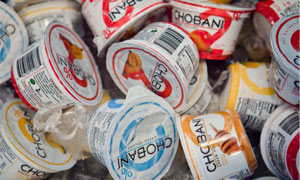Chobani Wins USDA School Lunch Yogurt Contract
 Chobani Greek yogurt, with a new processing plant in Twin Falls, Idaho, has won a USDA contract to supply its product to the National School Lunch Program this fall. USDA announced a pilot program last month to include Greek yogurt in school lunches in four states and opened solicitations, which closed July 22. On Friday, the agency announced that Chobani won the $279,720 contract to supply nearly 200,000 pounds of blueberry, strawberry, vanilla, and plain Greek yogurt from September through November to schools in Idaho, New York, Tennessee, and Arizona.
Chobani Greek yogurt, with a new processing plant in Twin Falls, Idaho, has won a USDA contract to supply its product to the National School Lunch Program this fall. USDA announced a pilot program last month to include Greek yogurt in school lunches in four states and opened solicitations, which closed July 22. On Friday, the agency announced that Chobani won the $279,720 contract to supply nearly 200,000 pounds of blueberry, strawberry, vanilla, and plain Greek yogurt from September through November to schools in Idaho, New York, Tennessee, and Arizona. That's good news for Chobani and Idaho dairy producers, said Bob Naerebout, executive director of Idaho Dairymen's Association. Dairy Farmers of America supplies all of Chobani's needs for its Twin Falls and New Berlin, N.Y., plants but is buying milk from other co-ops in Idaho to help fill the needs at the Twin Falls plant, he said. The growing interest in Greek yogurt is also helping other Idaho producers -- who supply ingredients to other yogurt companies -- and has a broad impact in Idaho, he said.
Chobani's contract with USDA will impact Idaho's thriving dairy industry and Idaho communities, said Sen. Mike Crapo, R-Idaho. Chobani's Twin Falls plant is the largest yogurt facility in the world, producing nearly 1 million cases of Greek yogurt per week, processing 2 million to 2.5 million pounds of milk per day, and employing 600 workers.
Chobani Communications Manager Lindsay Kos said the company is preparing a press statement on the contract to be released later today. In a press conference in Twin Falls in late May, Chobani officials said the plant has the capacity to process 10 million pounds of milk a day and has production lines waiting to commit.
They also anticipated a significant increase in the plant's milk needs if the pilot program in schools were approved. Crapo and his New York colleagues pushed for USDA's recognition of the nutritional value of Greek yogurt and the pilot program.
The National School Lunch Program operates in more than 100,000 public and nonprofit private schools and residential child-care facilities. The program cost $11.1 billion in FY 2011 and provides low-cost or free lunches to more than 31 million children each school day. By CAROL RYAN DUMAS / Capital Press
Chobani's contract with USDA will impact Idaho's thriving dairy industry and Idaho communities, said Sen. Mike Crapo, R-Idaho. Chobani's Twin Falls plant is the largest yogurt facility in the world, producing nearly 1 million cases of Greek yogurt per week, processing 2 million to 2.5 million pounds of milk per day, and employing 600 workers.
Chobani Communications Manager Lindsay Kos said the company is preparing a press statement on the contract to be released later today. In a press conference in Twin Falls in late May, Chobani officials said the plant has the capacity to process 10 million pounds of milk a day and has production lines waiting to commit.
They also anticipated a significant increase in the plant's milk needs if the pilot program in schools were approved. Crapo and his New York colleagues pushed for USDA's recognition of the nutritional value of Greek yogurt and the pilot program.
The National School Lunch Program operates in more than 100,000 public and nonprofit private schools and residential child-care facilities. The program cost $11.1 billion in FY 2011 and provides low-cost or free lunches to more than 31 million children each school day. By CAROL RYAN DUMAS / Capital Press
Last modified onSaturday, 06 May 2017 10:07
Latest from Admin TOA
- World Energy Council Türkiye Holds the Opening Meeting of the Young Energy Leaders (YEL’26) Program
- The Shared Pulse by Eda Uzunkara
- NEO HUMAN 10.0: How Will the Future Be Shaped? (Filiz Dag)
- Calculatit.net Is Bringing Pricing Transparency to America’s Construction Industry
- Support Independent, Trustworthy Journalism








